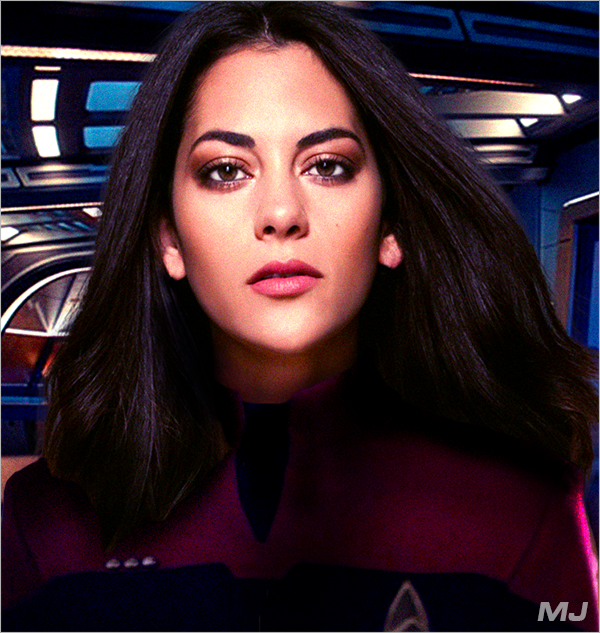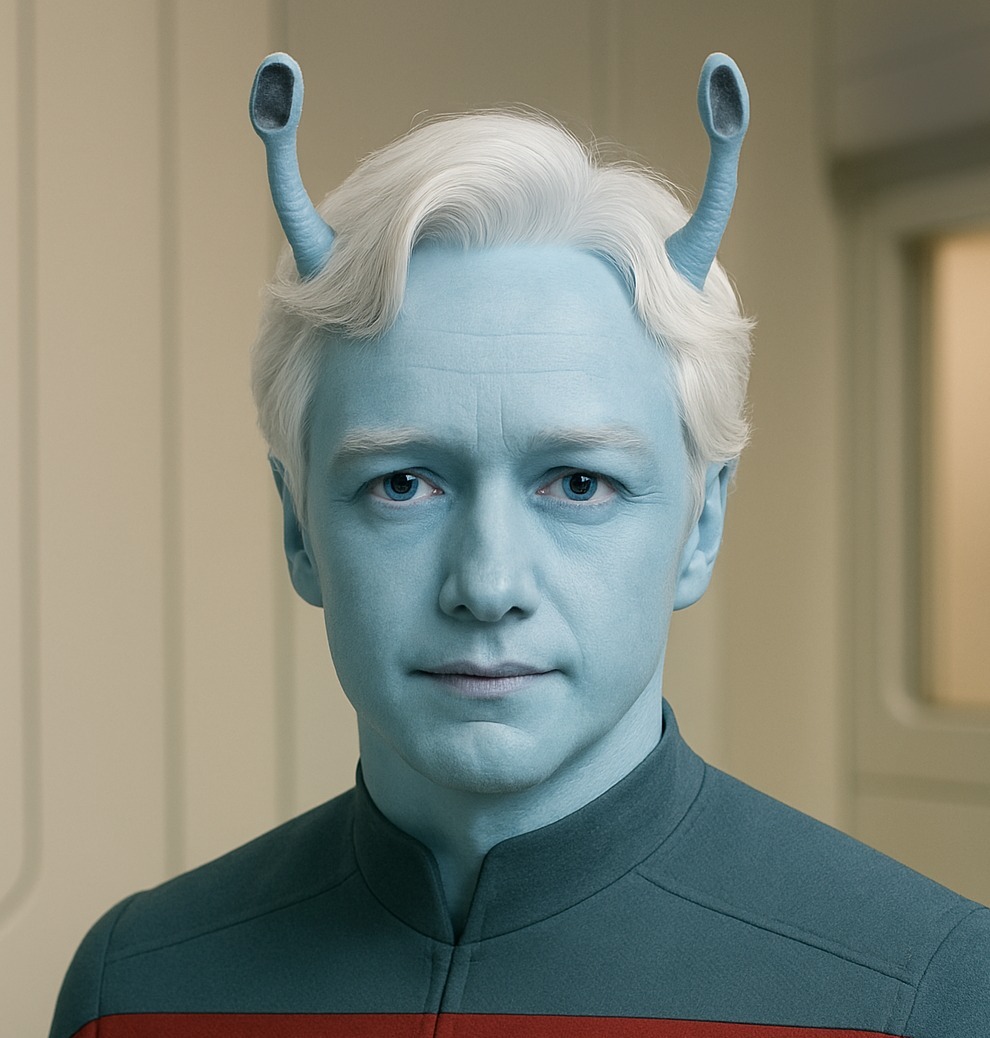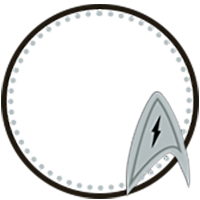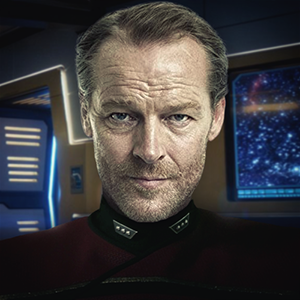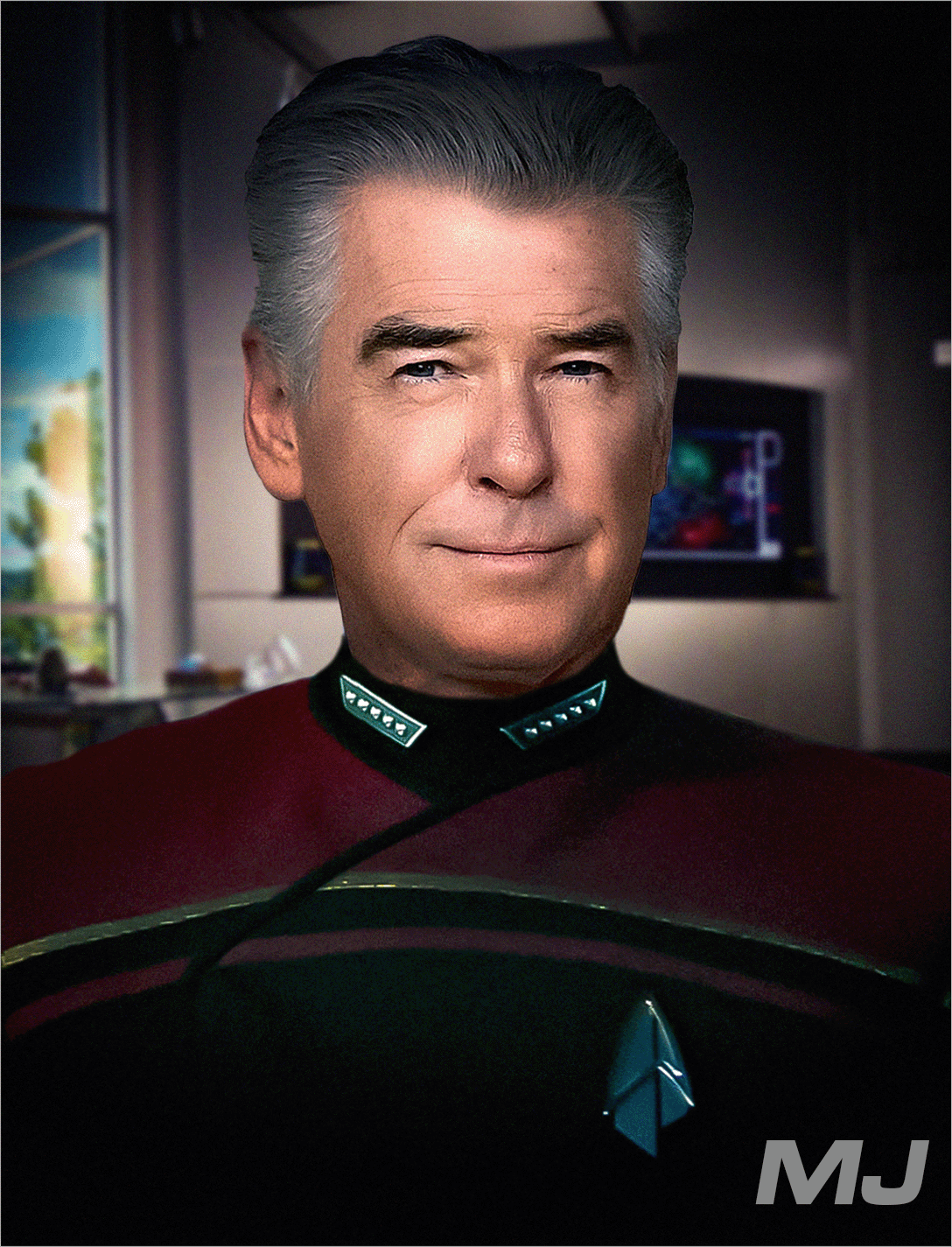Be ready... It’s a long one!
The silver disc streaked across the court, bouncing off the walls in a sharp, dazzling arc. Captain Romen Corbin pivoted, knees bent, phaser raised, and fired. The beam struck the side wall, ricocheted, and zipped toward Alkos with a bright flash of light.
Lieutenant Commander Alkos Reon dove to the side, rolling fluidly, phaser snapping up in a practised motion. The disc flared gold as it rebounded, narrowly missing him.
“You’re letting your left flank drift again,” Corbin called, eyes narrowed beneath the gloss of sweat on his brow. His athletic frame was tensed, every muscle honed from years of disciplined activity, his breath steady despite the pace.
“Flank secure,” Alkos said with a quick grin, pushing off the floor and leaping for another angle. “You just can’t predict me anymore, Captain.”
Corbin snorted, pivoting smoothly and firing again. The disc changed colour, blinking rapidly as it spun back across the hologrid. “Ten years, Reon. Ten years of weekly matches, and I still read your patterns better than you think.”
Alkos smirked, sliding to his knees, firing a quick shot that narrowly missed the target. “And I’ve been winning enough rounds to know I’m not predictable. Don’t get cocky just because you’ve got a few more victories recorded.”
The disc spun toward Corbin’s chest. He dove, slid across the grid, and fired instinctively. The beam ricocheted off a wall and ceiling, barely clipping the disc’s edge before it curved back toward Alkos.
“Not bad,” Alkos said through a breathless laugh. “But your aim is sloppy. You’re getting lucky on that last rebound, I’d call it.”
“Luck?” Corbin smirked, resetting his stance. “I don’t rely on luck. I track trajectories, the way the light reflects off the grid, the angle of your stance. That’s calculation, not chance.”
The disc zipped back, faster now. Sweat ran down both their faces, soaking their workout shirts and darkening their hair. Their breathing was sharp, measured, almost rhythmic, each movement precise yet effortless.
Alkos lunged, fired, and narrowly dodged the rebound that clipped the wall near his head. “Calculation, huh? Then explain this—” He feinted, spinning and firing in a wide arc, the disc whistling past Corbin’s ear.
“Observation,” Corbin countered, pivoting on a heel, eyes tracking the disc as it bounced again. He dove forward, catching it with a pulse from his phaser just as it began its next rebound cycle.
The final volley approached like a storm. Corbin stumbled. His boot caught the edge of the hologrid, and he went down hard. The disc streaked past him, golden and taunting. Alkos adjusted his aim, ready to finish the round.
Corbin rolled onto his back in one fluid motion, still holding his phaser. Without looking directly at the disc, he fired. The pulse hit the far wall, ricocheted off the ceiling, and struck the disc dead-centre. The chime rang sharp and clear.
“Full impact. Final round to Corbin. Winner: Corbin,” announced the computer in its neutral tone.
Alkos stood panting, hands on his knees, his grin wide but mock-exasperated. “You fell over. That’s not skill, that’s desperation.”
Corbin pushed himself upright, chest heaving, a faint sheen of sweat across his brow. “Desperation can be a very effective strategy. Ask any captain who’s ever been outnumbered.”
“Effective, maybe,” Alkos said, wiping his face with a towel. “Or just lucky. Either way, you’ve ruined my perfect streak for the week.”
“I’m so sorry for your loss, Reon,” Corbin countered sarcastically, holstering his phaser. “You know I keep careful track of those wins and losses.”
Alkos shook his head with a laugh. “Careful? Or obsessive?”
“Does it matter?” Corbin replied, grinning. “You’ll get your rematch. Same time next week, unless duty intervenes.”
“I’ll hold you to that,” Alkos said, tossing his towel aside. “And this time, I won’t hesitate on the final rebound.”
“You always hesitate,” Corbin teased lightly. “Ten years of hesitation, and yet you still think you’ll beat me.”
“Confidence,” Alkos shot back smoothly. “And a reasonable belief that you’ll make a mistake eventually.”
Corbin’s black Betazoid eyes twinkled with amusement. “Maybe. But not today.”
Alkos gave a grin. “Next week, Captain. Don’t get too comfortable.”
Corbin chuckled, shaking his head. “I never do.”
Alkos let out a slow exhale as he leaned against the far wall of the holodeck; the last pulse of the simulated disc fizzled out of existence. His dark hair clung damply to his forehead, and the edges of his shirt were soaked through, sticking to the sculpted contours of his chest. He tugged at the fabric and glanced at Corbin, who was leaning lightly against the near wall, arms crossed, his gaze distant but watchful as he caught his breath.
“So, sir, any idea when we’ll actually get our orders?” Alkos asked, voice casual but threaded with genuine curiosity. He wiped his forehead with the back of his hand and shook his head slightly. “I know Starfleet can be unpredictable. Sometimes they take their sweet time sending new mission orders, especially for ships that are ready to launch for the first time.”
Corbin’s black eyes flicked toward him, calm and reflective, but the ever-so-slight tightening of his jaw betrayed that the question had touched on something more profound. He shook his head slowly. “No. I haven’t received anything yet. Starfleet still hasn’t finalised our deployment orders. For all I know, it could be within hours or it could be days.”
Alkos nodded, stepping closer, his posture relaxed and easy. “I thought as much. But, if you don’t mind me saying, sir, that you seem a little tense. More than usual, I mean.” He tilted his head, studying the Betazoid captain with a mixture of curiosity and respect. “You’ve run through these launch checklists in your head a dozen times already, haven’t you?”
Corbin allowed himself a faint, almost imperceptible sigh after a smirk. “It’s the unknown that always carries the weight. The Atlas is ready, the crew is ready, but until the orders arrive, I can’t give them the first steps. And the first steps are always the most important.” He pushed off the wall slightly, straightening, his posture precise and confident, though a shadow of worry lingered in the set of his shoulders.
Alkos smiled knowingly. “I can see that. I’ve been around long enough to know you well enough to notice the little signs.” He reached behind his neck and began tugging off his drenched shirt in one smooth motion, letting it drop to the holodeck floor. The light caught the sheen of sweat on his well-defined six-pack and broad shoulders, his lean muscles flexing as he moved. He handed Corbin a grin that was both teasing and reassuring. “But don’t worry. The Atlas will be ready, and so will we. Every system, every crew member. We’ve been thorough. Commander Nelson and I have made sure of it.”
Corbin’s eyes followed the movement automatically before returning to Alkos’s face, appreciating the calm confidence in the officer. “I trust your word, Reon, I do. I wouldn’t expect anything less. But still,” He exhaled, running a hand over his short blond hair, the motion habitual yet almost ritualistic, “the wait is always difficult. I want everyone to be at peak readiness the moment the order comes through. No surprises.”
Alkos moved closer, draping the towel he’d pulled from his nearby duffel bag over his neck. “Surprises are for drills, sir. Not us. The Atlas is new, yes, and she’s sleek, maybe the slickest ship I’ve ever worked on, but she’s stable. All the systems respond as expected. Her hull integrity is solid, life support calibrated, and propulsion tested. You name it, it’s ready.” He paused, squinting slightly at Corbin. “And this crew is well-tested. They’ve served together long enough while on the Columbia to make sure of it. And if they’re not, then Commander Nelson and I will make sure they are. Trust me on that.”
Corbin’s gaze softened, the tension around his eyes easing fractionally. “I know you will, Reon. That’s why you’re in charge of operations. But you understand why I’m cautious? This is a first for all of us. Launching a ship this advanced and under unknown orders. It’s not always good. We should have known what we’re heading to, so we are fully prepped.”
Alkos leaned against the wall opposite him, arms crossed, a faint smirk playing across his face despite the sweat running down his temples. “And you’ll carry that weight, sir, because you’ve always done it. I’ve seen you handle situations that would make most captains break a sweat before even starting. You don’t need to worry about the ship or the crew. The Atlas will move flawlessly when the time comes.”
Corbin nodded slowly, eyes returning to the polished lines of the holodeck floor. He let the words sink in, appreciating the calm, analytical reassurance that came naturally from Alkos. He was a man who could read systems and people alike with equal skill. “I appreciate that, Reon. More than you know. But it’s not just technical readiness I’m thinking of. It’s timing, coordination. Avalon Fleet Yards has its procedures, and as soon as the orders arrive, I want everyone moving in sync. No hesitation.”
Alkos shook his head, a chuckle escaping him. “Captain, you’re expecting hesitation where there won’t be any. You’re projecting your anticipation onto us. The crew’s trained, motivated, and ready. We’ve spent months going over every department. No detail has been left unchecked. You can relax. Well, as much as one can relax in your position.”
Corbin gave a faint smile, the tension easing from his shoulders, though the focus in his posture remained. “Relax, yes. However, that’s easier said than done. But your confidence helps.” He paused, eyes scanning the corridor outside the holodeck, catching the soft gleam of the Atlas’s interior lighting. “She is beautiful,” he murmured almost to himself, the words a rare moment of reflection. “Sleek, new and alive. Almost like a fresh brand new cadet, waiting for their first assignment.”
Alkos nodded, towel still draped around his neck, expression thoughtful. “She is alive. That’s what makes her exciting. And if anyone’s going to get her off the ground efficiently, it’s this crew. And you, of course. You’ve always led by example.” He grinned, tossing a playful glance toward Corbin. “And don’t worry, I’ll make sure she doesn’t surprise anyone. Especially not you.”
Corbin let out a short laugh, the first genuinely relaxed sound since the match had begun. “I’ll hold you to that, Reon. I can’t afford to be surprised, not on my first mission with the Atlas.”
Alkos exhaled, dropping the towel to dry his palms before pulling on his uniform shirt again. The damp fabric clung slightly to his skin, a reminder of the intensity of the match they’d just completed, but he moved with an effortless, professional grace. “Consider it done, sir. Every panel checked, every console verified. Even the shakedown simulations are showing great results for us to go. We can move the moment the order comes.”
Corbin’s gaze softened, a fleeting trace of admiration in his black eyes. “Good. That’s what I wanted to hear.” He straightened fully, chest rising and falling in steady, controlled breaths, his posture radiating the quiet authority that made him a natural leader. “Avalon won’t be expecting the level of readiness we’ll show. And once the orders arrive, I want the crew to move as if they’ve been waiting for this exact moment their entire lives.”
Alkos smirked, hands on his hips. “Then we’ll give them exactly that, sir. And if the orders take longer than expected, we can always have a rematch on the holodeck. I’ll even let you win slightly faster next time.”
Corbin’s lips twitched with amusement. “I doubt it. But I’ll consider the offer.” He took a final deep breath, letting the energy of the holodeck fade completely, leaving the quiet hum of the Atlas behind them. The court, the lights, the reflected arc of the disc. It had all vanished, replaced by the gleaming holodeck grid.
Alkos shook his head again, smiling faintly. “You’re too serious sometimes, Captain. I think you need a reminder that the crew isn’t just capable; they’re ready, sharp, and confident. Trust me. And you can trust me.”
Corbin’s smile lingered, faint but discernible, as he nodded. “I do, more than I often admit. And thank you, Reon. Your confidence helps more than you might know.”
The two men stepped toward the holodeck exit together, each in his own rhythm. They were ready. But ready for what?
The rhythmic clip of hooves echoed across the expansive stretch of the moorland, the wind catching in the horses’ manes as Commander Elizabeth Nelson rode in the lead. Her short-cropped black hair barely moved beneath the gentle breeze, but the determined set of her jaw and the sharp gleam in her deep brown eyes left no doubt that she was in command. Behind her, Lieutenant Commander Stefanie Ortega followed, her long curly black hair bouncing lightly with each stride of her mount.
The Highlands stretched endlessly, rolling hills of heather and grass, stone fences, and distant glens unfolding as far as the eye could see. The smell of wet earth and grass was crisp, almost intoxicating, and Nelson’s lips curved into her signature half-smile. “Such fun,” she murmured, the words carried in the wind, a soft laugh escaping her.
Ortega snorted. “Fun? This is just wet, cold, and requires balance I don’t have.” Her lean frame tensed slightly with every step, muscles alert beneath the snug riding jacket. She adjusted her grip on the reins and muttered a quiet curse in Klingon under her breath. “I don’t see the appeal of horses. They’re noble creatures, yes, but why can’t we be riding an actual vehicle?”
Nelson’s eyes flicked back to her, amused. “You’ll see it soon enough, Stef. Or you’ll learn to fake enjoyment convincingly.” She gave her horse a gentle nudge, guiding it toward a lone tree at the crest of a small hill. “We can stop here. Stretch the legs, have a look at the view.”
Ortega followed obediently, rolling her eyes. “Stretch the legs for whom? The horse or me?”
Nelson chuckled, swinging herself down from the horse with ease and steady balance. She moved to Ortega’s side, offering a hand. “For both our four-legged friends. And for you, apparently. Come on.” Ortega’s fingers met Nelson’s grip, and with a slight grunt, she dismounted, landing with more grace than she expected herself.
Nelson tied the horses to the tree and gave them both a gentle tap of gratitude along their necks. Their heads bobbed slightly as they sniffed the air. Nelson took a step back and spread her arms toward the panorama of the Highlands. “Beautiful, isn’t it? When I was a little girl, my parents used to bring me here. An old great-aunt of my father’s had a large estate nearby. I’d ride these very trails, pretend I was exploring unknown lands. It became a habit. A love, I suppose.”
Ortega raised a brow, folding her arms over her chest. “So it’s a rich kid thing, got it. When can I go?” Her tone was flat, deadpan, the words cutting through the quiet like a scalpel.
Nelson laughed, a low, warm sound, the kind that hinted at amusement without condescension. “We were not rich, like that anyway. The estate had been in their family for generations. It had even survived the Third World War.
Ortega turned back to Nelson. “So it’s still a rich kid thing.” She looked back at the landscape. “I know Earth is filled with large landscapes, but this is very wet, damp, moist in fact. Too moist for me. You wouldn’t get this on Archer Four or—”
“Qo’Nos, yeah?” Nelson snapped a bit at Ortega. “Come on, Stef, can’t you appreciate anything that isn’t Klingon for once. Enjoy the greenery, the fresh air, and the silence. And stop saying ‘moist’ like that!”
Ortega’s eyes narrowed. “My husband is Klingon. My daughter is half-Klingon. I grew up with friends who were Klingon. Why can I not appreciate Klingon culture more than a soggy, wet, moist area of land? Anyway, I think I can handle green moist hills without your condescension.” She sighed heavily, rolling her shoulders as if the Highland air itself demanded effort.
Nelson gave a faint, indulgent chuckle. “Ah, you’ll forgive me, I suppose. But I should warn you that the lunch I brought isn’t going to meet any of your Klingon standards.” She reached into her satchel and produced a small box, setting it down gently on the grass. Inside was a modest but deliberate spread: a flask of steaming coffee, slices of cucumber sandwiches, and neatly cut cheese portions. She glanced at Ortega. “Just like my aunt used to make them before we went on our rides. No gagh here, I’m afraid.”
Ortega looked down at the food, then back at Nelson, unamused. “I guess I’ll eat it. Don’t expect me to be enthusiastic.” Her hands moved to unwrap the sandwiches anyway, her expression neutral, but her stomach evidently persuaded. It wasn’t as if she hadn’t eaten non-Klingon food before. Since her teenage years, she had preferred Klingon cuisine over other meals.
Nelson grinned. “You promised, Stef, to try something new before the Atlas launches. You can’t say I didn’t warn you.” She sat on the grass, tucking her legs to the side, and poured herself a small cup of coffee from the flask. The steam rose in the cool Highland air, filling the silence with a rich, earthy scent. She poured one for Ortega and passed it over.
As they ate, Ortega remained largely silent, picking at the sandwiches, her eyes scanning the horizon with guarded curiosity. Nelson, relaxed and content, occasionally glanced up to watch the wind ripple over the hills.
“It won’t be long until we’ll have to swap all of this for the real action once Atlas is launched,” Nelson sighed as she finished a mouthful.
Ortega nodded in agreement. “The sooner the Atlas leaves Avalon, the better. The ship is too ready. The captain has become obsessed with update reports about updates I do not have to give him.”
Nelson chuckled at that as she picked up her coffee. “Our Romen does like to be prepared and have everything all neatly organised. I think Starfleet giving him a cold shoulder about our first orders isn’t helping. I did prepare Reon that their velocity match might need to be a long one today to ensure the captain isn’t thinking about that. I do hope he succeeded.”
“Reon is an excellent velocity player, I am sure he will keep the captain distracted for a few hours and on his toes,” Ortega remarked as she bit down on some cheese and tried her expression of disgust from Nelson’s view.
The soft chime of the intercom cut through the quiet.
“Sickbay to Ortega,” spoke Doctor Carrilion’s voice.
Ortega straightened, her tone crisp and professional as she simply tapped her combadge under her riding jacket. “Go ahead, doctor.”
“I’m sorry to disturb you, but we’re experiencing a malfunction with the E-M-H. Could you come by and take a look, please?” Atlas’s chief medical officer sounded desperate in her tone.
“Acknowledged, Doctor. I’ll be right there.” She stood, brushing grass from her trousers, and nodded to Nelson. “Thank you for… a lovely time.” Her words were deadpan, betraying nothing of any genuine sentiment, but her movements were deliberate and precise.
Nelson raised an eyebrow, half amused and half exasperated. “Lovely time, huh? You make it sound like I’ve forced you to sing in a Vulcan choir, Stef.”
Ortega didn’t respond as she spoke up. “Computer, display holodeck exit.”
The holodeck shimmered slightly at her command, the gentle hills and highland mist dissolving as the large doors appeared as if by magic.
Nelson muttered under her breath, glancing at the fading landscape. “Honestly. Not sophisticated enough to enjoy a pleasant afternoon riding across the Scottish Highlands.”
Outside the holodeck and with the doors closed behind her, Ortega tapped her combadge again. “Lieutenant Commander Ortega to Doctor Carrillion,” she said smoothly. “Thank you for the call.”
“Ah, you’re welcome, Stef,” came Carrillion’s voice, tinged with amusement. “And don’t forget that you owe me a hot chocolate next time you’re in the crew lounge.”
Ortega sighed, the briefest hint of acknowledgement in her voice. “Fine. I’ll make sure to bring the marshmallows too!” She turned down the corridor, her strides purposeful, efficient, leaving behind the lingering aroma of coffee and the remnants of the simulation. She was far from social, but not unmoved. She would honour the promise, begrudgingly, yes. Though she enjoyed spending time with her former mentor, being on the holodeck and riding horses was not Ortega’s thing. However, after losing a game of poker to Nelson the night before, her payment was to spend at least an hour on the holodeck riding fake horses. An hour was now up, and she had asked Doctor Carrillion to call her with a fake emergency to escape the damp, wet, soggy, moist Highlands. Ortega just wanted to spend her free afternoon on her own, in her quarters, reading the latest Klingon romance novel her husband had sent her.
Back on the holodeck, Nelson remained for a moment, watching the door where Ortega had gone through disappear and return to the luxury view of the Highlands. A wry smirk tugged at the corners of her lips. The horses, now quiet and tethered, seemed almost content in the silence of the empty holodeck. She lifted her coffee, took a small sip, and shook her head with quiet amusement. “Some people,” she muttered, “just don’t appreciate a view.”
Shuttlecraft Compass
The type-fourteen shuttlecraft Compass cut through the twilight skies of Avalon II, its nacelles glowing faintly against the fading orange horizon. Below, the sprawling expanse of Sato City shimmered with activity.
At the controls sat Lieutenant junior grade Starok, posture perfectly upright, eyes steady on his readouts. The Vulcan’s hands moved across the console with measured precision, each adjustment calculated, each movement devoid of waste. Since they left Sato City, Starok had barely said a thing. In fact, he had kept silent.
Behind him, Lieutenant Commander Velesa reclined in her seat, one leg crossed over the other, an unmistakable gleam of satisfaction in her bright blue eyes.
“Well,” she said, stretching her arms above her head with a delighted sigh. “That was quite the conference. I’m not sure I’ve ever heard so many people argue about the philosophy of exploration instead of the science of it.”
“An intriguing topic,” Starok replied without turning. “Though I would argue that philosophy and science are not mutually exclusive pursuits.”
Velesa smiled, the corners of her mouth quirking. “I’m sure you would.”
Across from her, Lieutenant Rowal chuckled softly. It was a deep, smooth sound that contrasted with the shuttle’s hum. He leaned back in his seat, arms folded, his Deltan composure as effortlessly calm as ever. “For the record,” he said, “I counted five panels where the presenters argued over whether the Federation’s reach should be limited by ethics or curiosity.”
Velesa’s eyes sparkled. “Ah, yes, the eternal debate; how far is too far when there’s a new nebula waiting to be discovered? Or far do we want to go to find new resources?”
Starok adjusted the shuttle’s heading and finally looked back over his shoulder, the faintest crease forming between his brows. “Both questions are easily answered by applying logic, not conjecture.”
“Of course they are,” Velesa teased. “Everything is, according to you.”
Rowal smirked. “Careful, Commander. You’ll just encourage him to explain how logic applies to conjecture.”
“I would be happy to,” Starok said, entirely sincere.
That broke the restraint Velesa had been holding. A musical laugh escaped her lips, filling the cockpit with warmth. “Oh, please don’t. I’d like to enjoy the flight home without a dissertation on Vulcan logic.”
“Your wish is noted,” Starok replied blandly, though the faint arch of his eyebrow might almost have been amusement.
The easy rhythm of conversation settled comfortably between them. The three officers had long since moved beyond formalities. Velesa had spent years sharing data with Starok across joint research assignments; Rowal had stood with both of them through enough drills and crises to earn a place in their small circle. There was mutual trust here, unspoken but constant, like the steady hum of the shuttle’s engines.
After a few moments of companionable silence, Rowal glanced toward the Vulcan. “So, Starok, any word yet on our first orders?”
“None,” came the curt reply. “Captain Corbin has not been forthcoming with operational details. He remains preoccupied with the Atlas’s readiness.”
Velesa let out a soft, knowing chuckle. “Of course he does. I imagine he’s inspecting every bulkhead himself to make sure the ship maintains that ‘brand-new starship’ smell.”
Starok didn’t even blink. “I was not aware that ships possessed an odour.”
Rowal grinned, shaking his head. “It’s a figure of speech, Starok. Something that Commander Nelson keeps going on about.”
“I see no logical purpose in explaining how sensory attributes to an inanimate—”
Velesa interrupted him with a wave of her hand. “It’s poetic, darling. You know, emotional resonance? The thrill of a new beginning?”
“I do not experience ‘thrill,’ Commander.”
“Clearly,” Rowal said dryly.
That drew another laugh from Velesa. “Don’t listen to him, Starok. You’re thrilling enough in your own tolerant way.”
Starok raised one eyebrow in response. “I was unaware my restraint could be classified as ‘thrilling.’”
“It’s a gift,” Rowal said, smiling faintly.
The shuttle hit a light patch of turbulence, and Starok’s hands flew instinctively to the controls. The movement was quick, practised, and even graceful. The Compass steadied in seconds.
“Approaching Avalon Fleet Yards,” Starok announced, his voice as even as ever. “Docking clearance has been granted. Our estimated time of arrival is three minutes and twenty-one seconds.”
Velesa pressed a hand to the viewport, gazing at the magnificent structure ahead. The Atlas filled their view. She was sleek, gleaming, powerful. Even from this distance, the Andromeda-class starship was breathtaking. Rows of floodlights bathed her pristine hull in soft white light.
“There she is,” Velesa murmured, awe and affection threading through her voice. “Our new home.”
Rowal followed her gaze, his usually impassive features softening. “She’s… something,” he admitted. “She always appears bigger every time I see her from this angle.”
“Functionally speaking,” Starok said, “her design optimises exploration capacity and operational efficiency by fourteen per cent compared to the Ross-class. Furthermore, she does not get bigger. Unless the captain plans to expand the ship further, she would become an Odyssey-class.”
Velesa smirked. “In other words, she’s beautiful.”
“I would not use that term.”
“Well, I would,” she said lightly. “And I plan to keep her that way. You too, Rowal. No scorch marks, no phaser burns, and definitely no boarding parties if we can help it.”
“I’ll do my best,” Rowal said. “But no promises. Security gets messy.”
“Science gets messy too,” she replied cheerfully. “I once had an antimatter containment failure ruin an entire week’s worth of experiments. And my shoes.”
“I presume your footwear is irrelevant,” Starok said.
“Not to me, it wasn’t,” Velesa said with mock indignation. “They were red!”
The shuttle glided closer, aligning perfectly with the Atlas’s shuttle bay. The polished hull panels reflected the Compass like a silver mirror.
Rowal exhaled slowly. “Feels good to be home.”
Starok nodded. “Indeed. This vessel represents Starfleet’s highest standard of design and capability. Our continued presence aboard will ensure that the standard is maintained.”
Velesa turned to him, her smile softer now. “Starok, that was almost sentimental.”
“I was merely stating a fact.”
“Of course you were.”
The Compass slipped through the atmospheric containment field, touching down with a gentle hum. The hangar deck gleamed, pristine and silent. A team of engineers waited at a respectful distance, datapads in hand.
As the shuttle ramp lowered, Velesa stood first, gathering her satchel and flashing a wide grin at her crewmates. “Well, gentlemen, shall we make ourselves useful?”
Rowal stood, his tone dry but warm. “Lead the way, Commander. I’ll try not to get any ‘security mess’ on your shoes.”
She shot him a playful look. “See that you don’t.”
Starok powered down the console with his usual precision, rising to join them. “It would appear, Lieutenant, that you and I share a common objective. Keeping Commander Velesa’s footwear uncontaminated.”
Velesa’s laughter echoed through the shuttlebay as they stepped off the small craft together.
The panoramic windows of Ten Forward stretched in a long, gleaming arc, bathing the lounge in the soft amber glow of Avalon Fleet Yards’ docking lights. Beyond the framework of nearby drydocks, shimmering against the darkness, each was alive with the quiet hum of final preparations. The Atlas herself was immaculate. Her hull plates polished to mirror perfection, nacelles gleaming with a faint cerulean pulse.
At a table near the viewport, Doctor Carrillion leaned back in her chair, swirling a spoon through a tall glass of Thalian hot chocolate. The drink was topped with a crown of real whipped cream, melting lazily into the dark sweetness below. She sighed contentedly, her smile soft and unguarded.
“Now this,” she said, drawing out the words with that lyrical Tyran cadence of hers, “is the only thing that can save a doctor after twenty-seven hours of last-minute medical readiness checks.” She took a long sip and closed her eyes. “Sweetie, it’s better than shore leave.”
Across from her, Counsellor Merrendis laughed. It was the kind of quiet, musical laugh that filled a space without breaking its peace. She sat poised, legs crossed, a delicate glass of Risan wine in hand. “You say that every time you’re exhausted,” she teased lightly. “And yet, I notice the glass always seems to get larger each shift.”
Carrillion opened one eye, mock-offended. “Are you diagnosing me, Counsellor?”
“Just observing,” Merrendis replied, her voice a silk-smooth blend of humour and calm. “I’d say the prognosis looks delicious.”
They both chuckled, the easy laughter of old friends. Around them, the lounge was alive with a low murmur—a range of officers sharing late-night drinks and quiet conversations.
For a long moment, they simply sat in comfortable silence, watching the slow rotation of the drydock’s service arms beyond the glass.
“It still feels strange,” Merrendis murmured eventually, her gaze fixed on the shining hull.
“After everything, the chaos of the last few years, sitting here, knowing we’re part of something new again.”
Carrillion nodded slowly. “You’re telling me. After the Vaadwaur attacks across the Alpha and Beta Quadrants, I didn’t think I’d ever see Avalon this still again. Do you remember that night when the first set of news came in?”
Merrendis nodded, her expression growing distant. “The comm channels within the system were chaotic. We barely knew what was happening. Worlds were burning, and here we were, with hundreds of ships docked and powerless to help thanks to that Blackout.” She shook her head softly. “It was like being trapped in a snow globe while the world outside froze over.”
Carrillion’s hand reached across the table and brushed Merrendis’s wrist, not as comfort, but as solidarity. “We did what we could afterwards. It mattered, even if it didn’t feel like it.”
Merrendis smiled faintly. “You always know how to find the good in the bad.”
“I’m a doctor,” Carrillion replied, her tone brightening with that trademark spark. “It’s my job to see the recovery, not the wound.”
That drew a quiet laugh from the counsellor, her eyes soft with affection. “And that,” Merrendis said, “is why you keep this ship and half the crew sane.”
Carrillion grinned. “Oh, sweetie, that’s your department. I just patch up what you can’t fix with words.”
The mood lightened again, and Merrendis leaned back, gazing at the faint reflection of Atlas’s registry number on the glass. “You know,” she said, “when I think of the Columbia… it still hurts.”
Carrillion’s expression softened. “I know.”
“That new crew that took after us,” Merrendis continued quietly. “They didn’t know the ship as well as we did.”
“No, they didn’t,” Carrillion agreed, her tone low but resolute. “But they did their duty on her, and the Columbia went down doing what Starfleet does best—trying to protect others. That’s what she was built for. What we were built for.” She took another sip of chocolate, then smiled wryly. “And now, the Atlas gets her chance.”
Merrendis tilted her head, a thoughtful gleam in her eyes. “Do you think it’ll be the same?”
“No,” Carrillion said, setting down her glass. “And thank the stars for that. This ship, she’s different. She’s a new ship, with an old crew that knows how to get the job done. Corbin’s not the kind to let history weigh him down. He’ll make sure this ship finds her own path.”
“That’s true,” Merrendis admitted, a soft fondness in her tone when she said the captain’s name.
“He’s steadier than most. I think he still worries about what happened to the Columbia, though he’d never admit it.”
Carrillion gave a knowing smirk. “He can’t fool me, honey. He’s been sitting on edge since the day the Atlas started her warp tests. I told him to take a break, go to the holodeck, unwind, but he just smiled and said, ‘Doctors worry too much.’”
“Ah,” Merrendis replied, smiling gently. “Being a former counsellor himself, it’s clear that he hasn’t spent enough time in counselling for himself.”
Carrillion laughed, warm and genuine. “You should make that your mission statement.”
“I’ll embroider it on my uniform,” Merrendis said dryly, then took a slow sip of her wine. “But truly, I’m grateful we’re all together again. After Columbia’s loss, I wasn’t sure I’d ever feel that sense of home aboard a ship again.”
Carrillion nodded, a wistful glint in her eyes. “Home isn’t the hull. It’s the people. Always has been.”
Outside, a Starfleet workbee drifted past the window, its running lights tracing arcs of gold across the glass. The reflection painted the two women in soft, shifting light.
“Hopefully we’ll know more soon,” Merrendis said after a pause, her voice quiet but certain, “so that we can start again together.”
Carrillion raised her mug in a small salute. “To the Atlas.”
Merrendis smiled, clinking her glass against it. “To second chances.”
“To second chances!”
They drank together and continued talking about their new ship with their old crewmates.
Their adventure was just about to begin, so they hoped.

 Bravo Fleet
Bravo Fleet








